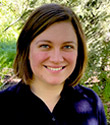Jun 28, 2023
'A Safe Place': Rural HIV Patients and Providers Fight Stigma, Isolation Through Connection
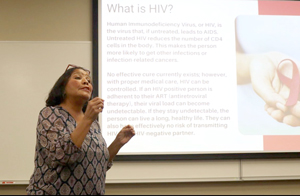
For one group of women in rural Louisiana, the COVID-19 pandemic — and subsequent shift from in-person gatherings to Zoom meetings — came as what Aimee Starnes describes as "a blessing in disguise."
Starnes and her team at Volunteers of America Southeast Louisiana (VOASELA) had historically had a difficult time organizing support groups for rural people living with HIV in their region: "Groups have been a hard thing in this area, because many people don't want to participate," Starnes, who serves as Program Director at VOASELA, explained. "They don't want to put their face out there; they don't want to put their name out there."
For VOASELA's Stepping Stones Program, which provides services and support to women living with HIV in rural southeastern Louisiana, the shift to video calls — in which cameras could be turned off, and people could join anonymously from the comfort of their own homes — changed things. Soon, women from across the region were logging onto support meetings and group education sessions, exchanging phone numbers, and forming friendships with other women with HIV, often for the first time in their life.
More than 40 years after the first cases of AIDS were reported in the U.S., HIV treatment and prevention tools are more advanced and accessible than they've ever been — leading, as a recent Centers for Disease Control and Prevention report found, to an overall decline in the number of estimated new HIV infections per year. But in some rural areas, lingering stigma and misunderstanding still stand as barriers to the prevention and treatment of the virus.
In two decades of working in HIV services in urban and rural Louisiana, Starnes says she's witnessed significant improvement in the quality of medical treatment options available to patients. And in the nearby cities of New Orleans and Baton Rouge, where "people are a lot more open" about their diagnoses than they used to be, conversations about preventing and living with HIV have become increasingly mainstream, Starnes says. But outside of urban areas, the tone of those conversations often drops to a whisper, if they're had at all — leaving rural communities more susceptible to the virus, and many rural patients unable, or unwilling, to seek out care and support close to home.
Things have definitely changed as far as treatment and medications go. But one of the things that I have not seen a change in is how people are living with HIV in the rural communities.
"Things have definitely changed as far as treatment and medications go," Starnes said. "But one of the things that I have not seen a change in is how people are living with HIV in the rural communities."
A Virus That 'Thrives On Disparities'
HIV infection rates are still higher in urban areas than in rural areas in nearly every state. But the South, where more than half of all new HIV infections have been reported in recent years, has seen higher diagnosis rates in rural communities than the rest of the country. A Centers for Disease Control and Prevention (CDC) analysis of HIV data from 2016-2017 identified seven priority states — primarily clustered in the South — with a "substantial rural burden" of new HIV diagnoses, meaning that 10% or more of all diagnoses in those states occurred in rural areas.
Meanwhile, the availability of HIV-related services such as testing, prevention education, Pre-Exposure Prophylaxis (PrEP), and medical treatment is lower across the board in rural counties than in urban counties, with rural areas linked to lower testing rates and a higher likelihood of late HIV diagnosis.
"Once any infectious disease gets into a more rural space, all of those health disparities that exist in rural spaces perpetuate the epidemic," said Katherine Schafer, MD, an Associate Professor of Infectious Diseases at Wake Forest University School of Medicine and a clinician who works with HIV patients in North Carolina. "We know that in rural settings of the United States, there tend to be higher rates of poverty, higher rates of food insecurity, lower incomes, and lower rates of educational attainment. And all of those social determinants of health are going to perpetuate any illness or disease that thrives on disparities."
Rural HIV patients experience all of the same challenges that rural populations face generally when it comes to accessing healthcare, including challenges around transportation, child care, provider shortages, and technological access, noted Phillip Marotta, PhD, an Assistant Professor of Social Work at Washington University in St. Louis.
But HIV patients and at-risk rural residents may also face additional barriers specific to HIV, such as a sense of stigma or shame, a lack of public awareness on the topic, a gap in HIV-specific knowledge among some rural providers, and mental health challenges resulting from feelings of social isolation. And for some rural patients, breaking down these barriers could quite literally be a matter of life or death.
…stigma…shapes the decisions people make when they decide to go seek and access care.
"All of the same bigger issues that affect rural communities are going to affect HIV care," Marotta said. "But then there's another list of issues that are unique to HIV, and the two lists intersect with one another. The role of stigma is very important, because it shapes the decisions people make when they decide to go seek and access care."
Starting a Conversation
For Five Horizons Health Services, a nonprofit organization providing a range of HIV-related outreach and care services across Alabama's rural Black Belt region and eastern Mississippi, breaking down stigma begins with meeting rural communities where they are. That means tailoring educational messaging to a community's unique values and needs, building relationships with local partners, and making sure people are able to relate to outreach materials and messengers.
"We learned that people want to see people that look like them," said Katherine Waldon, MPA, Chief Programmatic Officer for Five Horizons. "That's how you catch people's attention, because they say, 'That person looks like me and this is a PrEP ad. Why would someone that looks like me need to be on PrEP?' It starts that conversation."
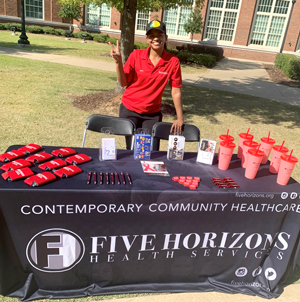
Five Horizons' outreach efforts include social media campaigns, pamphlets and flyers, and educational presentations on HIV prevention, primarily targeting people at high risk for infection and people who live in areas with high infection rates. The organization has also worked with students at the University of Alabama to develop its own app where people can find information about HIV prevention and symptoms, make an appointment to get tested at one of Five Horizons' clinics or community sites, and view their test results.
"While marketing materials are important, the number one thing is building relationships," said Billy Kirkpatrick, PhD, Chief Executive Officer for Five Horizons. "So we try to employ people that represent the folks we're trying to reach."
The Five Horizons team also regularly presents to college and high school students across the region, including in rural schools. In conversations with school administrators, staff, and parents, Five Horizons representatives emphasize the need to correct misinformation that students may be hearing from their classmates, Waldon said.
"We put the power back in the parents' hands and say, 'We want you to be your child's primary source for this information, so we want to educate you too,'" Waldon said. "We see a lot of success in taking that approach and saying, 'Hey, we know that as a parent you want your child to be comfortable talking about this with you, and that they're going to be seeking advice from their friends. How great would it be for you to be able to equip your child with the right information?'"
'Persistence and Consistency'
Building public knowledge around HIV prevention, in rural communities and elsewhere, is "a continual educational awareness project," said Fayth Parks, PhD, founder of the Rural HIV Research and Training Conference and former chair of the American Psychological Association's Committee on Psychology and AIDS.
For public awareness efforts to be effective, they must be consistent and sustainable, Parks, a licensed psychologist and professor of leadership and psychology in the Graduate School of Leadership and Change at Antioch University in Ohio, said: "If it comes in PSAs for a while, and then it disappears and goes away, people fall right back into those myths and misinformation."
Some common myths, highlighted in an upcoming paper co-authored by Parks on misinformation about HIV in rural communities, include the beliefs that HIV "doesn't happen here in rural communities," or that "I'm too old to get it."
Collaborative partnerships within rural communities can be a powerful tool for public education, said Gregory Felzien, MD, Medical Director at Georgia Positive Impact Health Centers Inc., a Georgia-based agency providing HIV specialty care services.
But building these partnerships takes time, effort, and consistency, Felzien noted. They cited the example of one local business group in a rural Georgia community that asked them to give a presentation about HIV and public health at their monthly meeting, promising an audience of about 80 people. Six people showed up, Felzien said.
"Eight or nine months went by, and they reached out again and said, 'We want you to come back and give another presentation,'" Felzien recalled. "I said, 'Well, six out of 80 people showed up.' And they said, 'Don't worry about it. Just show up.'"
This time around, 20 people came to their presentation. When they returned again the following year, 30 people were there; the year after that, 70 people.
Facilities and systems don't build collaborative partnerships — people within the systems do.
"It's about persistence and consistency," Felzien said. "Facilities and systems don't build collaborative partnerships — people within the systems do. And when they leave, there's a huge gap that isn't filled until somebody steps up and rebuilds those partnerships."
Care Close to Home
For patients who don't want their family or neighbors to know about their HIV-positive status, something as simple as the layout of the local health clinic might be the difference between getting treatment close to home or driving hours to do so: Felzien recalls one clinic in rural Georgia, in which general care services were located to the right of the lobby and HIV care and prevention services were located to the left.
"If I go left, I just disclosed something that I may not want to disclose to my community," Felzien said. "So people are traveling outside the community to get that care."
Among the rural patients Felzien sees, it's not uncommon for people to have three pharmacies to maintain a greater level of privacy: A pharmacy in their own community for general medications; a pharmacy in the next county over for pain medications; and a pharmacy for their HIV medication several counties away.
Like gaining the trust of the local community at large, gaining the trust of individual patients takes time and effort, Felzien said — and can be a difficult thing to accomplish in rural areas with high turnover rates for providers. Shortly after they started working in one Georgia town, Felzien says, they saw a patient who had been diagnosed three years prior. Since then, the patient had been driving to a city an hour away for specialty care, unaware that they could have seen a specialist in their hometown.
"'I lost my insurance and my providers told me I could be seen closer to home, but no one [in the local community] seemed to be aware of your clinic,'" Felzien recalls the patient telling them. The patient had "considered stopping [their] HIV medications altogether and basically dying, because they thought they had no place to go."
"At that point," Felzien said, "I had to pause and say, look, we need greater community involvement here."
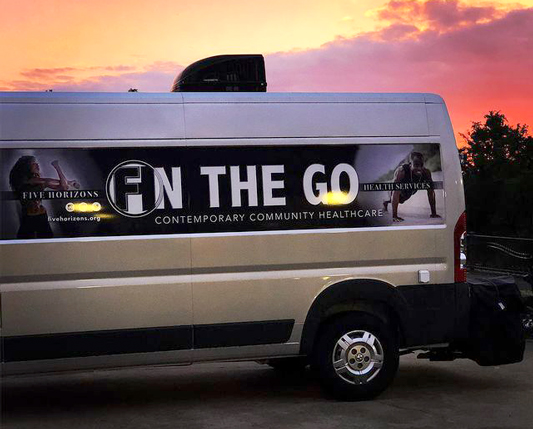
Showing What Works
A fear of stigmatizing behavior or judgment may also play a role in a patient's decision whether to visit — or revisit — a provider, Marotta said.
"When we're thinking about someone who acquires HIV through injection drug use, it's a different kind of stigma that they experience than someone who acquires HIV through sexual behavior," Marotta said, noting that factors including sex and age can also play a role in how a person experiences stigma. "This experience can shape the willingness of people in rural communities to seek treatment from providers that are within their local community, versus driving three hours to the nearest HIV center."
As part of an ongoing research project on the impact of stigma on the adoption of PrEP and other interventions at rural Federally Qualified Health Centers (FQHCs), Marotta and his team have interviewed roughly 400 rural providers in seven priority states identified by the federal Ending the HIV Epidemic in the U.S. initiative. While the study isn't finished yet, the researchers have identified some preliminary patterns in the findings, Marotta said.
"What we're seeing is that rural providers are more willing to offer HIV services than in the past, but they don't all necessarily approve of it," Marotta said, noting that roughly half of all rural providers interviewed so far have expressed concerns about the perceived risks of providing PrEP to patients, or reported that prescribing PrEP doesn't align with their social and cultural values. "We're at this point where there's a lot of openness to providing services, but at the same time, there's a lot of hesitation among certain providers, and we need to do better research to understand that."
To alleviate the concerns of providers who are hesitant to provide PrEP and other HIV-related services, Marotta believes the best approach is an evidence-focused one: Demonstrating to unsure providers how PrEP and other interventions have been effective in preventing the spread of HIV elsewhere through testimonials from providers in other rural communities, and, if the provider is not already offering HIV prevention services, encouraging them to start on a trial basis.
Marotta also emphasized the importance of giving rural people with lived HIV experience a seat at the table in the clinic environment, whether as peer navigators, community health workers, or in another role.
"There's a saying that the people who should be solving problems are the people who are closest to the problems," Marotta said. "You don't need to have lived experience to do the work, but we do need to have people who are close to the problem helping to solve the problem."
Someone to Confide In
For HIV patients, having a strong social support network isn't only a matter of mental and emotional health — it may also have an impact on physical health, research suggests.
"There are strong data that have consistently shown that the more social support people report having, the better their HIV-specific outcomes," Schafer said. "And in the larger human experience, we know that community is an important part of our well-being. So it makes sense that in the setting of any chronic illness, especially one that's associated with so much stigma and misconception, community could make a big difference."
Of the nearly 40 Stepping Stones participants in Louisiana, "many didn't know another woman, much less another person, living with HIV" before joining the VOASELA program, Starnes said. Many also hadn't felt comfortable disclosing their status to their family or friends, she said: "So they had to go through this on their own without having someone to confide in."
Along with group support and educational sessions, the Stepping Stones model also provides case management services to rural women living with HIV, specifically targeting women who are newly diagnosed, who have fallen out of care, who never entered care in the first place, who have canceled or missed at least two appointments in the last year, or who have comorbidities that affect their ability to be retained in care. Throughout the program, participants engage with a peer facilitator — a fellow woman living with HIV — through individual one-on-one sessions, which gives them the opportunity to ask questions and discuss issues that are personally relevant to them.
While the Stepping Stones program officially ends in August at the end of a three-year grant from the Health Resources and Services Administration (HRSA) Ryan White HIV/AIDS Program, VOASELA intends to incorporate some aspects of the program into its regular HIV programming, Starnes said, including the Zoom-based support groups.
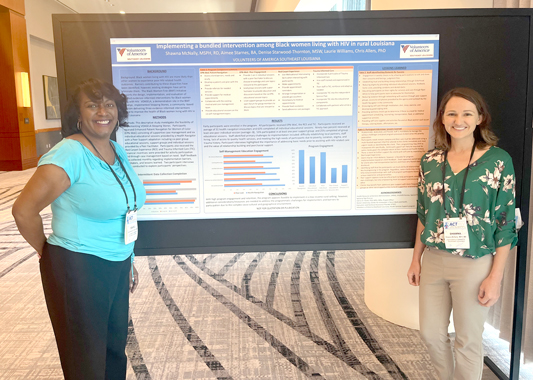
"It's a daunting thing, to be in a rural area where you don't have necessarily have support, you're not necessarily able to access the healthcare you need, and you're isolated," said Parks, who has studied the impact of stigma on the mental health of HIV patients. A shortage of mental health professionals in rural communities across the country has exacerbated these challenges, Parks added, making it harder for many patients to access needed mental healthcare and resources.
But where a small-town environment may make it more difficult for HIV patients to find privacy or peer support, others may find social strengths in the tight-knit nature of rural communities, Parks said.
The close-knit environment can cause problems, but the close-knit environment can also be a wonderful support.
"One of the things that I really love about rural communities is the sense of connection within the community," Parks said. "Which, you know, works both ways: The close-knit environment can cause problems, but the close-knit environment can also be a wonderful support."
Supporting Rural Providers
While patients log onto virtual support sessions in southeastern Louisiana, another group across the country has also taken to Zoom to discuss HIV with their peers: healthcare providers.
The Project ECHO (Extension for Community Health Outcomes) model, a framework that originated at the University of New Mexico, lets providers join a virtual community with fellow providers to learn from specialists, discuss their own cases and questions, and offer support and feedback to one another. These programs typically center on one or more specific conditions — such as HIV — and have a regional focus. ECHO programs can provide rural participants with valuable and rare opportunities to connect with their peers, program leaders say.
"There are a lot of challenges for clinics and providers outside our metropolitan areas who are trying to help prevent or care for people with HIV, including a real lack of specialty support and difficulty getting patients to specialists when needed," said Brian Wood, MD, Medical Director of the Mountain West AIDS Education and Training Center's (MWAETC) ECHO program, which serves providers in Alaska, Colorado, Idaho, Montana, North and South Dakota, Oregon, Utah, Washington, and Wyoming.
"When providers working outside of the major cities have questions, I think they can feel very isolated, since they often don't have colleagues to turn to and run cases by," Wood continued. "These providers may not see a lot of people with HIV, but when they do, we want them to be well-equipped with the latest tools, resources, and guidelines."
In virtual sessions, providers learn the latest guidelines and other best practices from specialists across the region. But the discussion portion of the sessions also lets rural providers hear from — and learn from — each other.
"Connecting providers who work in a similar context — for instance, connecting a provider who works in a smaller town in Wyoming with a provider in a smaller town in Alaska — really provides a level of support above and beyond what we [program organizers and specialists] can provide ourselves," Wood said.
For participants in the HIV ECHO Program at Indiana University–Purdue University Indianapolis (IUPUI), which serves providers in Indiana and other states, the program's peer support network has produced a sort of ripple effect, said Andrea Janota, MPH, Director of the IUPUI ECHO Center — an important byproduct especially for providers who may not have the time or staffing capacity to regularly participate in sessions.
"People are really creative in terms of finding ways to spread that information [from the sessions] even further," Janota said. "We've definitely heard stories of, 'Oh, I knew I could call or email so-and-so and ask them a question and they would know what I was going through.' And that network is sustainable — even if the ECHO goes away, you still have those connections with people."
The multidisciplinary nature of the ECHO model — which brings together not only medical providers but also pharmacists, social workers, and others — can be especially valuable for participants in rural areas where "more niche providers," such as addiction therapists, "might not be as readily available," Janota noted.
"We have people from all aspects of the care continuum joining, and I think that's a really unique opportunity," said Caroline Kryder-Reid, MPA, who serves as ECHO Program Management Specialist for the IUPUI program. "You can really have a holistic conversation to ensure that you're providing the best care that you can."
Growing a National Network
On a national scale, Parks founded the Rural HIV Research and Training Conference in 2012 with those same kinds of connections and holistic conversations in mind. At the time, she was working with the American Psychological Association to train other licensed psychologists in working with HIV patients, and was struck by the challenge of reaching psychologists in more remote rural communities.
"It dawned on me that there was a need for us to pull folks together for new information and learning, but even more importantly, for support and to talk to one another," Parks said. From there, the idea for a rural-specific conference was born.
Felzien, the Conference Clinical Chair, describes the event as "a safe place where you have rural providers talking to rural providers."
After a year on pause, conference organizers plan to resume the annual event in 2024, Parks said. In the meantime, she and her fellow organizers are working to expand their growing network of rural HIV providers from across the country.
"In rural communities, it's not a one-size-fits-all situation," Parks said. "Communities have their nuances. And this is an opportunity for folks to have that conversation."

